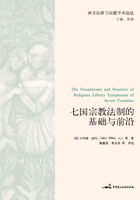Ath. I will explain my meaning still more clearly. They say thatfire and water, and earth and air, all exist by nature and chance, andnone of them by art, and that as to the bodies which come next inorder-earth, and sun, and moon, and stars-they have been created bymeans of these absolutely inanimate existences. The elements areseverally moved by chance and some inherent force according to certainaffinities among them-of hot with cold, or of dry with moist, or ofsoft with hard, and according to all the other accidental admixturesof opposites which have been formed by necessity. After this fashionand in this manner the whole heaven has been created, and all thatis in the heaven, as well as animals and all plants, and all theseasons come from these elements, not by the action of mind, as theysay, or of any God, or from art, but as I was saying, by nature andchance only. Art sprang up afterwards and out of these, mortal andof mortal birth, and produced in play certain images and verypartial imitations of the truth, having an affinity to one another,such as music and painting create and their companion arts. Andthere are other arts which have a serious purpose, and theseco-operate with nature, such, for example, as medicine, and husbandry,and gymnastic. And they say that politics cooperate with nature, butin a less degree, and have more of art; also that legislation isentirely a work of art, and is based on assumptions which are nottrue.
Cle. How do you mean?
Ath. In the first place, my dear friend, these people would say thatthe Gods exist not by nature, but by art, and by the laws of states,which are different in different places, according to the agreement ofthose who make them; and that the honourable is one thing by natureand another thing by law, and that the principles of justice have noexistence at all in nature, but that mankind are always disputingabout them and altering them; and that the alterations which aremade by art and by law have no basis in nature, but are of authorityfor the moment and at the time at which they are made.-These, myfriends, are the sayings of wise men, poets and prose writers, whichfind a way into the minds of youth. They are told by them that thehighest right is might, and in this way the young fall into impieties,under the idea that the Gods are not such as the law bids themimagine; and hence arise factions, these philosophers inviting them tolead a true life according to nature, that is, to live in realdominion over others, and not in legal subjection to them.
Cle. What a dreadful picture, Stranger, have you given, and howgreat is the injury which is thus inflicted on young men to the ruinboth of states and families!
Ath. True, Cleinias; but then what should the lawgiver do whenthis evil is of long standing? should he only rise up in the state andthreaten all mankind, proclaiming that if they will not say andthink that the Gods are such as the law ordains (and this may beextended generally to the honourable, the just, and to all the highestthings, and to all that relates to virtue and vice), and if theywill not make their actions conform to the copy which the law givesthem, then he who refuses to obey the law shall die, or suffer stripesand bonds, or privation of citizenship, or in some cases be punishedby loss of property and exile? Should he not rather, when he is makinglaws for men, at the same time infuse the spirit of persuasion intohis words, and mitigate the severity of them as far as he can?
Cle. Why, Stranger, if such persuasion be at all possible, then alegislator who has anything in him ought never to weary ofpersuading men; he ought to leave nothing unsaid in support of theancient opinion that there are Gods, and of all those other truthswhich you were just now mentioning; he ought to support the law andalso art, and acknowledge that both alike exist by nature, and no lessthan nature, if they are the creations of mind in accordance withright reason, you appear to me to maintain, and I am disposed to agreewith you in thinking.
Ath. Yes, my enthusiastic Cleinias; but are not these things whenspoken to a multitude hard to be understood, not to mention thatthey take up a dismal length of time?
Cle. Why, Stranger, shall we, whose patience failed not whendrinking or music were the themes of discourse, weary now ofdiscoursing about the Gods, and about divine things? And thegreatest help to rational legislation is that the laws when oncewritten down are always at rest; they can be put to the test at anyfuture time, and therefore, if on first hearing they seem difficult,there is no reason for apprehension about them, because any manhowever dull can go over them and consider them again and again; norif they are tedious but useful, is there any reason or religion, as itseems to me, in any man refusing to maintain the principles of them tothe utmost of his power.
Megillus. Stranger, I like what Cleinias is saying.
Ath. Yes, Megillus, and we should do as he proposes; for ifimpious discourses were not scattered, as I may say, throughout theworld, there would have been no need for any vindication of theexistence of the Gods-but seeing that they are spread far and wide,such arguments are needed; and who should come to the rescue of thegreatest laws, when they are being undermined by bad men, but thelegislator himself?
Meg. There is no more proper champion of them.
Ath. Well, then, tell me, Cleinias-for I must ask you to be mypartner-does not he who talks in this way conceive fire and waterand earth and air to be the first elements of all things? These hecalls nature, and out of these he supposes the soul to be formedafterwards; and this is not a mere conjecture of ours about hismeaning, but is what he really means.
Cle. Very true.
Ath. Then, by Heaven, we have discovered the source of this vainopinion of all those physical investigators; and I would have youexamine their arguments with the utmost care, for their impiety is avery serious matter; they not only make a bad and mistaken use ofargument, but they lead away the minds of others: that is my opinionof them.
Cle. You are right; but I should like to know how this happens.
Ath. I fear that the argument may seem singular.















